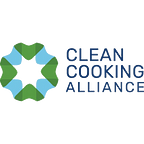Women Entrepreneur Series: Expanding Access to Biogas During a Pandemic
By: Jessica Borbee
As the COVID-19 pandemic continues to threaten peoples’ access to basic necessities like clean cooking energy, Esther Altorfer, Managing Director of East Africa at Sistema.bio, shares insights about how her organization is dealing with the new challenges they face. Altorfer also highlights a unique advantage of biodigesters and biogas in the times of COVID-19.
A finalist for the Clean Cooking Alliance’s 2019 Woman Entrepreneur of the Year Award, Altorfer works in the Kenya office of Sistema.bio, a Mexico-based social enterprise that manufactures, distributes, installs, and finances biodigesters that convert waste into cooking energy and fertilizer. Sistema.bio was also recently selected to join the Clean Cooking Alliance’s new Venture Catalyst portfolio. This interview is the first in a series showcasing women entrepreneurs in the clean cooking sector.
Biodigesters may not have been designed with social distancing in mind, but in the era of COVID-19, they are proving to be exceptionally well-suited, according to Esther Altorfer, Managing Director of East Africa at Sistema.bio. Unlike many other cooking technologies, biodigesters eliminate the need to leave home to collect or purchase external sources of fuel.
“Our biodigesters have always been relevant, but this pandemic is highlighting the need for it because those who have biodigesters can still cook, fertilize their farms, and grow food without leaving their homes. Our product is built for resilience,” said Altorfer.
The pandemic has, of course, imposed some unique challenges. With travel restrictions remaining in place in Kenya, Sistema.bio has had to identify novel ways of maintaining a steady stream of new clients.
“We [typically] do a lot of door-to-door sales, but our sales agents are finding it difficult to do that now because of health concerns,” said Altorfer.
One solution Sistema.bio has found useful is coordinating with referral programs or local organizations that can connect them with new markets. Another sales strategy is motivating sales agents with bonuses and other financial incentives that are paid the same day, rather than at the end of the month. With many families’ expenses increasing due to children and other family members spending more time at home, this source of instant financial relief and job security has proven to be extremely beneficial.
“Everybody is adapting really fast,” said Altorfer. “We sold more biodigesters [in April] than we did [in March] which is quite an encouraging sign.”
The pandemic has also forced Sistema.bio to become more creative when communicating with current customers. “[COVID-19] has helped us prioritize innovative changes in the way we work,” said Altorfer. “We had already digitized our data collection through a mobile app that allows us to connect with customers over the phone, but we are now developing tools for remote troubleshooting as well.”
Part of the traditional sales package that Sistema.bio offers after the installation of a new biodigester is a set of three, in-person trainings for each client. For the second of these trainings, Sistema.bio has been able to transition nearly 80% of visits to phone-based assistance (in-person training is still available if customers require extra support).
“We had been thinking about offering remote training for a long time, and the coronavirus has given us the opportunity to test and implement it,” explained Altorfer.
As these recent innovations in Sistema.bio’s operations continue to expand, Altorfer sees herself as a critical intermediary between her Kenyan team and the company’s CEO, Alex Eaton, and CFO, Graham Day. To instill confidence in investors and donors, Altorfer has been coordinating with Eaton and Day to adjust Sistema.bio’s business model and fundraising approaches based on COVID-19 response policies. At the same time, Altorfer is working to ensure her whole team — composed of 130 sales agents and staff members, serving 3,400 clients in and around Nairobi — remains aware of any operational changes.
“Being in close communication with my team and understanding what is happening on the ground has been particularly important,” said Altorfer.
As Sistema.bio looks to future growth plans, Altorfer’s role as a leader is constantly shifting, and keeping her team healthy and informed is a top priority.
“I am focusing on building a support system to allow people to do their work, and customizing that support to cater to those who have children or who need flexible working hours,” said Altorfer. “This situation is hard, and it’s important to remind everyone of our mission, why we’re here, and of the amazing impact that [Sistema.bio] is having on the lives of Kenyan farmers.”
